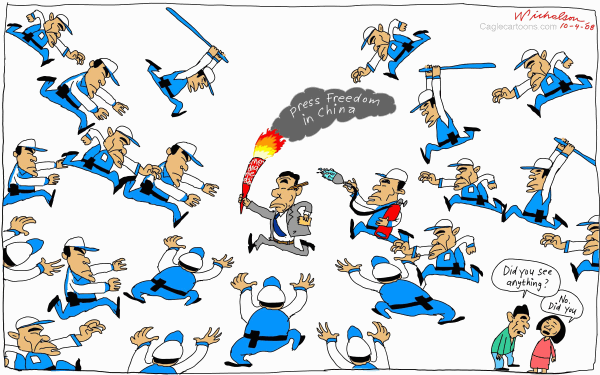If the show fits, throw it…
I was speaking to Zach, “monk in the Sycamore tree“, Xiao Shuang today about events of late in Iraq. Xiao Shuang and I disagree on many things related to soldiering, patriotism and heroism, but our mutual hunger for meaningful conversation only grows when we debate.
Zach believes that losing one’s life in war or service to a national imperative is akin to dying as a result of a drug overdose or any similar free will decision of dubious moral merit. As a veteran, son of a soldier lost to war wounds and diligent supporter of post-conflict care for the needs of soldiers after their premature introductions to death and human suffering–as if there were a good time for such things. I am emotionally unable to deny feelings of pride and admiration for warriors and even if I cannot reconcile for myself any reason or rightness for a battle in which they may have had a dubious ideology foisted upon them I support their sacrifices and bravery. Xiao Shuang provisionally acceded that it is OK for one to give up one’s life for a cause, but only a worthy one, and then only though non-violent resistance.
Xiao Shang, with a slight nod, acknowledged my feelings and left that dialogue for another time–no story is ever unfinished with us, thank goodness. He went on to query my feelings about the war in Iraq beginning with questioning whether or not I understood the cultural significance of shoes being thrown at President Bush in an Islamic country. I gave a didactic/pedagogical answer: In the Middle east the throwing of shoes is a symbol of contempt and a grave display of disrespect far weightier than the physical act appears to be (even showing someone the sole of your foot is an insult) even a culturally impaired observer. I shared with Xiao Shuang that I had recently polled Chinese business students about the leather clad curse thrown at my nation’s leader: I asked students if they thought that the act should be classified as an act of aggression or as an expression of anger that qualified for protection as freedom of speech. The responses caught me by surprise.
My students manufactured this scenario: They likened Bush to the Prime Minister of Japan during the occupations of Manchuria and Nanjing and made clear that the throwing of shoes in Iraq was neither freedom of expression nor a reasonable expression of anger. The former was too aggressive to qualify for protection as mere freedom of speech and the latter was not nearly an aggressive enough act in their angry estimation.
The most recent war in Iraq was likened to the war invented by the Japanese in order to justify an incursion into Manchuria to rob China of much needed natural resources. And they compared the spread of rhetoric and doublespeak about building democracy in the Middle East to the propaganda spoken by the Imperial Army’s mainland invasion leaders, those based on assertions that they were merely unifying Asia for the sake of Asia’s preservation against American influences. Visiting occupied soil, bombed and blood-stained on orders of the Bush administration, could only bring pain, anger and anguish on the citizenry and would be weakly represented by merely throwing shoes. They were openly pleased that the last chapter in Bush’s public record bore a size 10 seal of disapproval. They doubted pro-war voices that say the war won him the right to express himself through shoe tossing.
(OMBW note: Does not look like much has changed in Iraq and China Smack has a very telling article here: Chinese Reactions)
I will save debate for later by asking Xiao Shuang and maybe students, if my contract allows, what would have become of any of us had Allied Forces not interceded with force in the Pacific during WWII. I am guessing his answer will be rooted in a call for love and compassion and acceptance any current suffering as a fraction of many yet to come in lifetimes beyond this one as we progress toward “The Right Way”.
Zach digressed a bit and went on to explain that he had viewed actions of the west, directed toward China as a whole during the Olympics, as a metaphorical set of shoes; a symbol not only of contempt, but of aggression against the Chinese people. A pastor from California painted upscale hotel rooms to “give a voice to the voiceless” (Xiao, a Buddhist, says he does not want or need a second larynx donated by a vandal) during the Olympics; and Amnesty Australia put Olympic tourists in harm’s way by asking them to act on Amnesty’s behalf in protest of China’s Internet firewall. Xiao Shuang smiling, wondered out loud why Amnesty Australia has not concentrated on its own censorship issues. “To spoil and politicize for the average Chinese citizen, most of whom neither know nor are affected by China’s online controls, our time to celebrate and embrace the athletic heroes among us was a clearly a lack of sensitivity and understanding of our culture and the pride we felt for the Games.
To believe that those who are subject to censorship are simply suffering in silence or incapacitated by fear is nonsense. The Chinese people are not as docile or as compliant as the media would make them out to be. And we don’t need lectures on the virtues of western life as much as we need tools of empowerment, education, and community building. We also don’t need meaningless regime challenging exercises that only steel the resolve of those have not outgrown the need for power. They may raise funds for the groups involved but they only fuel ignorance and hatred. For the west to rally against situations they have not fully studied is like ranting at fire because it burns.”
Today China’s navy headed out to a sea beyond its territorial borders for the first time in 600 years to battle Somalian Pirates. Zach and I will not agree on this one. I am behind the EU and China in patrolling the waters to ensure the safety of their citizens and their property.
It will be interesting to hear the mediatative musings of Xiao Shuang as the rich and poor get poorer and the girth of hungry anger expands….
Asia,Beijing,Beijing Olympics,China Cartoons,China Economics,China Editorials,China Law,Videos







